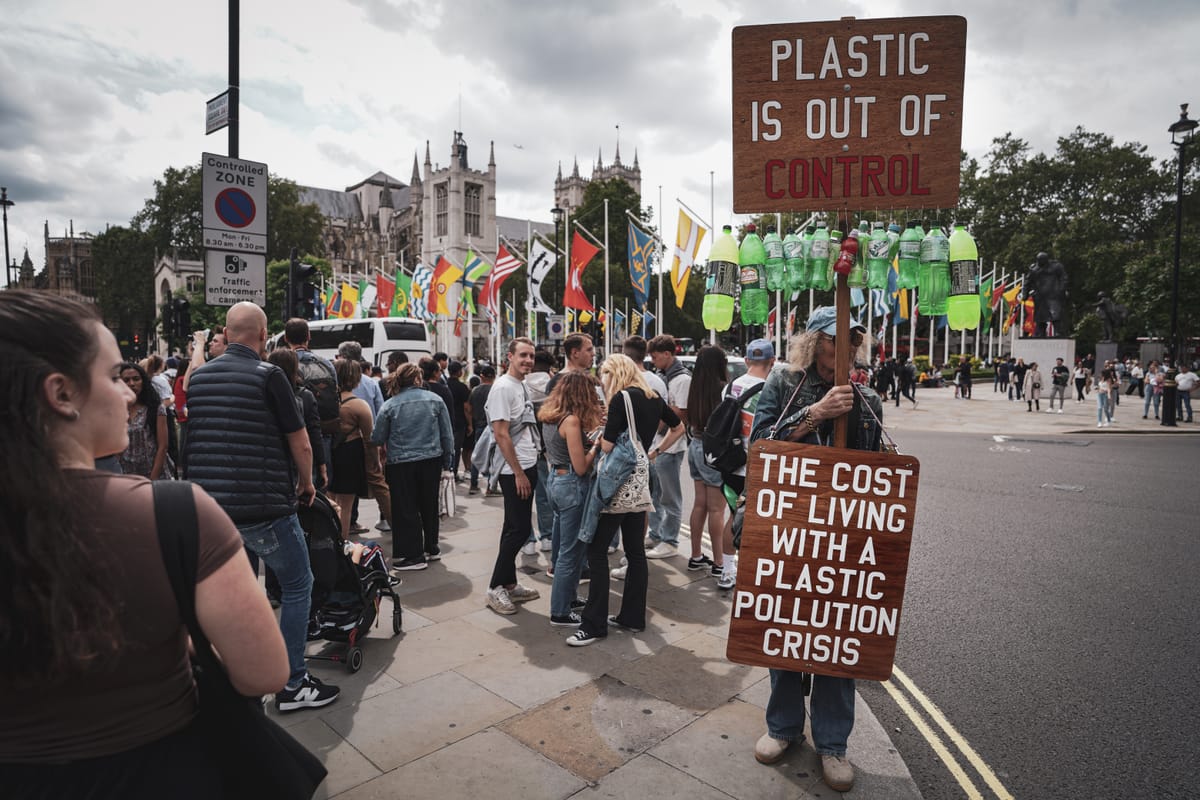Even if the entire world electrifies and switches to renewable energy, that wouldn’t be enough to stop Earth from hurtling past the 1.5 °C warming limit by century’s end, as set by the Paris Climate Agreement. To meet this goal requires more than just halting the combustion of fossil fuels — the missing piece of the puzzle to rein in global warming is plastics.
Made up of the same hydrocarbons that drive the Earth’s anthropogenic pyrexia, plastics contribute to greenhouse emissions even if they’re not incinerated. A new report from the Lawrence Berkeley National Lab in California, published in April, estimates that plastics release most of their greenhouse emissions during production, long before the final product reaches the consumer. The act of using plastics itself may not be directly pollutive — provided you dispose of the product properly — but their existence is a physical testament of the emissions needed to create them.
Plastics production is an energy intensive process. Per the report, 75% of plastics’ carbon footprint comes from fossil fuel extraction, chemical refining, greenhouse leakages, and making the precursor materials. Moreover, many of the production steps require high operating temperatures beyond what can be achieved by electric heating; this makes the industry reliant on nonrenewable energy sources.
As of 2019, plastics contribute to 5.3% of global greenhouse emissions. But that number is expanding. As society pivots away from fossil fuels as an energy source, petrochemical companies are doubling down on plastics to secure their economic future. At the current trajectory, plastic production is expected to double or triple by 2050.
“It's the fastest growing source of emissions,” says Neil Tangri, science and policy director for the advocacy network Global Alliance for Incinerator Alternatives.
If we’re ready to take a hard look at plastics, what will meeting international climate goals take? In terms of the global carbon budget, that means scaling back plastic production by 12-17% every year, according to Tangri’s calculations. Otherwise, manufacturing plastics alone is poised to suck up the little wiggle room the world has to meet our climate goals. At the rate the industry is ballooning, plastics could consume the world’s entire carbon budget by 2060, he estimates.
The biggest draw of plastics use is that it's artificially cheap. On top of the government subsidies the industry receives, the price tag on plastics also doesn’t reflect the true burden of managing these synthetic chemicals: the negative social, environmental, and healthcare impacts of plastic pollution. Plastics, either in their macro form or as microplastic debris, have choked wildlife to death, contaminated our drinking water, and been revealed to promote neurodegenerative diseases such as Parkinson’s. According to a 2021 report commissioned by the World Wildlife Fund, all the plastic generated in a year will cost $3.7 trillion over its lifetime, a figure which factors in the public toll of the material. That means for every dollar consumers spend on a fresh piece of plastic, society will have to fork out at least ten times as much to grapple with it in the long run.
Despite the low prices, plastics manufacturers are still able to turn a profit from sales, because the industry has jettisoned the auxiliary logistical costs that once were theirs to deal with. Just within the last few decades, Tangri recalls, beverage hawkers collected empty glass bottles from buyers for refilling the next drink; diaper providers picked up soiled cloth diapers from new parents and replaced them with industrially washed ones. As single-use plastic alternatives gradually replaced reusable goods after the mid-twentieth century, their sellers no longer needed to foot the bill for collection and cleaning. Instead, wrangling with this new kind of waste fell to the city and municipal services. And local waste management services are buckling under the weight of this long-lasting plastic heap.
Tangri recognizes that consumers have little option to eschew plastics completely. They’re so entrenched in the market that plastic-free alternatives are hard to find or more costly than their carbonaceous counterpart. Instead, companies bear the moral responsibility to shutter their production and bring back alternative business models that once flourished in the era of reusables. “But I'm also enough of a realist to know that that's not going to happen on its own,” Tangri says.
Not quite so fantastic, life in plastic now calls for something drastic.
In the past year, there has been significant momentum for worldwide action. A series of international meetings is underway to draft the first global treaty on plastics. Hosted by the United Nations Committee on Plastics Pollution, the meeting drew over 170 countries to the table to discuss curbing plastics on a global scale. Late April 2024 saw its fourth meeting out of five, with the last one to occur by the end of 2024. If all goes smoothly, the treaty could be implemented early next year after all member states sign off.
It’s too soon to say what the treaty will look like, but Tangri, who attended the meeting, expects that text will contain both “carrots” and “sticks.” Some of the incentives that are explored include financial assistance to dismantle legacy industries and build up alternative business to occupy the economic niche plastics will vacate. Tangri also would like to see “sticks” in the form of international trade provisions such as tariffs on plastic commodities.
Above all, he hopes that the treaty will have significant portions that are legally binding. That’s in line with what a majority of the nation participants want, many of whom are from the Global South and have demonstrated “real leadership” on the issue, Tangri says. But treaty negotiations need to strike a balance between enforceable actionability and flexibility, lest oil producing counties walk away from the deal altogether.
As the 1.5 °C warning post looms large, Tangri believes that this could be the treaty to move the needle on plastic pollution and get the world to clean up its act. “We have a chance right now with this treaty to reverse the plastic pollution problem, but also to take a huge bite out of the climate problem,” he says. “I don't think we have a choice.”




